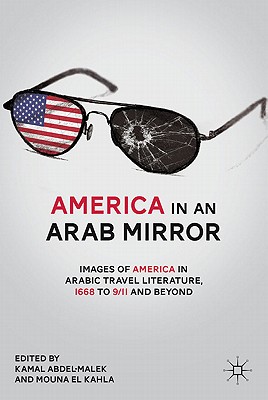 When I was in Dubai in the spring, I ran into my first-year Arabic professor, Kamal Abdel-Malek. He’s the man who had us marching around the room doing “Arabic aerobics” to learn our numbers–fun and effective and, according to his wife, still part of his teaching repertoire!
When I was in Dubai in the spring, I ran into my first-year Arabic professor, Kamal Abdel-Malek. He’s the man who had us marching around the room doing “Arabic aerobics” to learn our numbers–fun and effective and, according to his wife, still part of his teaching repertoire!
It doesn’t surprise me that he’s also put together a fun but instructive anthology of Arab travel writing, America in an Arab Mirror. It should be required reading for American travel writers, and anyone who intends to write about another culture.
Honestly, you really could read any book about America written by a foreigner and learn a lot about the pitfalls of travel writing: the broad generalizations, the hasty conclusions, the not-quite-right facts (one writer in this book mentions how famous Colorado is for its oranges!).
In a decade of work as a travel writer, I’m embarrassed to say this is the first time I’ve intentionally read a book like this. I wish I’d done it years ago–I would’ve been far more conscious of how easy it is to go off the rails. I mean, I know you’re not supposed to extrapolate a whole culture from a single conversation with your taxi driver, but it’s not clear how bad it sounds until you read a half-baked theory about your own culture based on a similar one-off chat.
This makes it sound like the writing in this book is terrible. That isn’t true. Most of the writers take great pains to say that, for instance, a rewarding talk with a Catholic priest on an airplane of course can’t represent a country as diverse or huge as America.
Some of the older excerpts, from texts from the early 1900s, however, have a broader, happy-to-generalize tone, and one of the wackiest is Sayyid Qutb’s. He’s notorious for having come to study in the U.S. and been so alienated that he went back to Egypt and rallied the Muslim Brotherhood. In the excerpts of his writing in America in an Arab Mirror, he’s shocked at how casually Americans seem to treat death–laughing at a wake, for instance, or discussing life-insurance details just days after a death. But where Qutb sees only the harshness of life here, other visitors come to entirely different, kinder conclusions.
But this book is remarkable even if you’re not a travel writer. Much of it is a sweet reminder of the image America holds in the rest of the world. Arabs are awed by America’s wilderness, diversity and kind-hearted people.
They’re also intrigued–and a pit put off–by details we barely even notice. Shafiq Jabri, a Syrian author, says Americans live a “boiled” life, similar to the boiled food we eat–cooked fast, with not much concern for flavor. Egyptian Karima Kamal, who presumably has dealt with crowds in Cairo, describes a day out at Taste of Chicago, and wonders why people would subject themselves to such a horrible mob scene. Saudi politician Ghazi Abd al-Rahman al-Qusaybi deconstructs American TV ads, pointing out how one will promote cheese-covered food and the next will tout Slim Fast.
Some of this can seem like quite heated criticism of America–but it’s also a way to see what Arabs value in their own culture by contrast. Journalist Jadhibiyya Sidqi is shocked at how Americans let their parents waste away alone in retirement homes. Reading the statement “Arabs value family” is abstract; reading Sidqi’s chagrin and sincere sadness makes it more concrete.
Not every excerpt is gripping, and occasionally the translations are stilted–shout-out to Dima Reda, a fellow CASA student, whose translations are some of the best. (In one dopier move, a writer goes to the striptease bars in a town south of Chicago called Kaloomeet. I’d laugh harder at this misspelling, if this weren’t the story of my Arabic-reading life, sounding out words that I think are Arabic, only to find out they’re some English proper noun.)
But ultimately all the pieces in the book–even the cranky and misinformed ones–work together to show an image of Arabs as well. And when we see how easy it is for a visitor to get the wrong impression when visiting the U.S., it’s wise to consider just what might be wrong with our image of the Middle East. The mirror of the title works both ways.
(Here’s a good review of the book and interview with Kamal, with a hilarious end anecdote, in the New York Times.)
Have you read travel writing about your own country? Do you have other books to recommend? I’d love to hear about them.